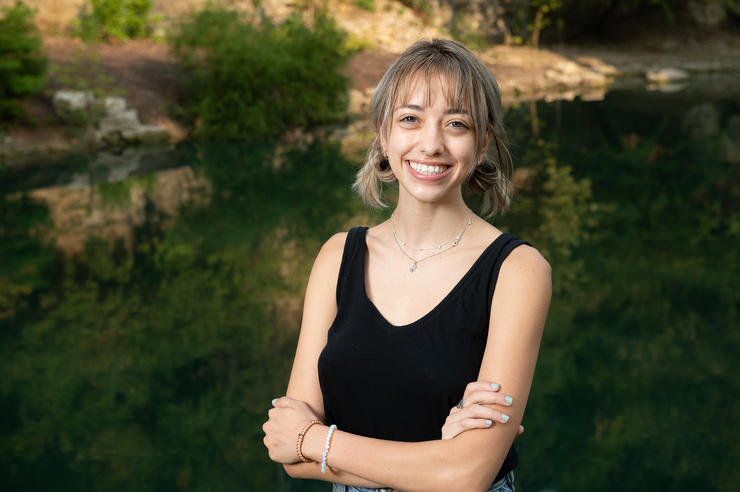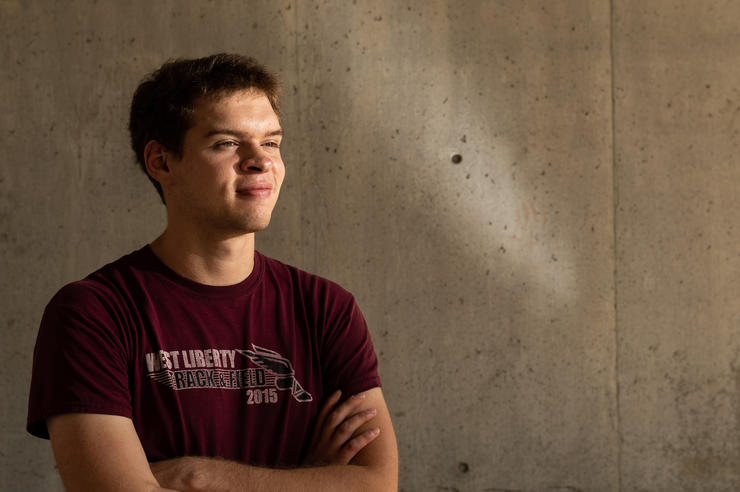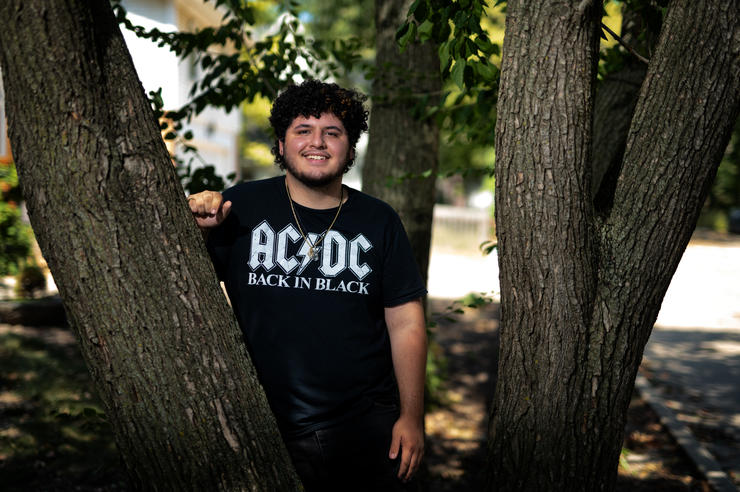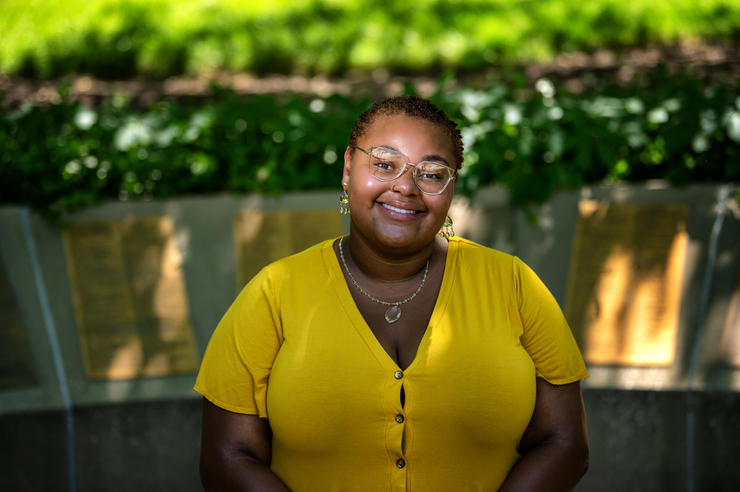Finding opportunity and a place that feels like home
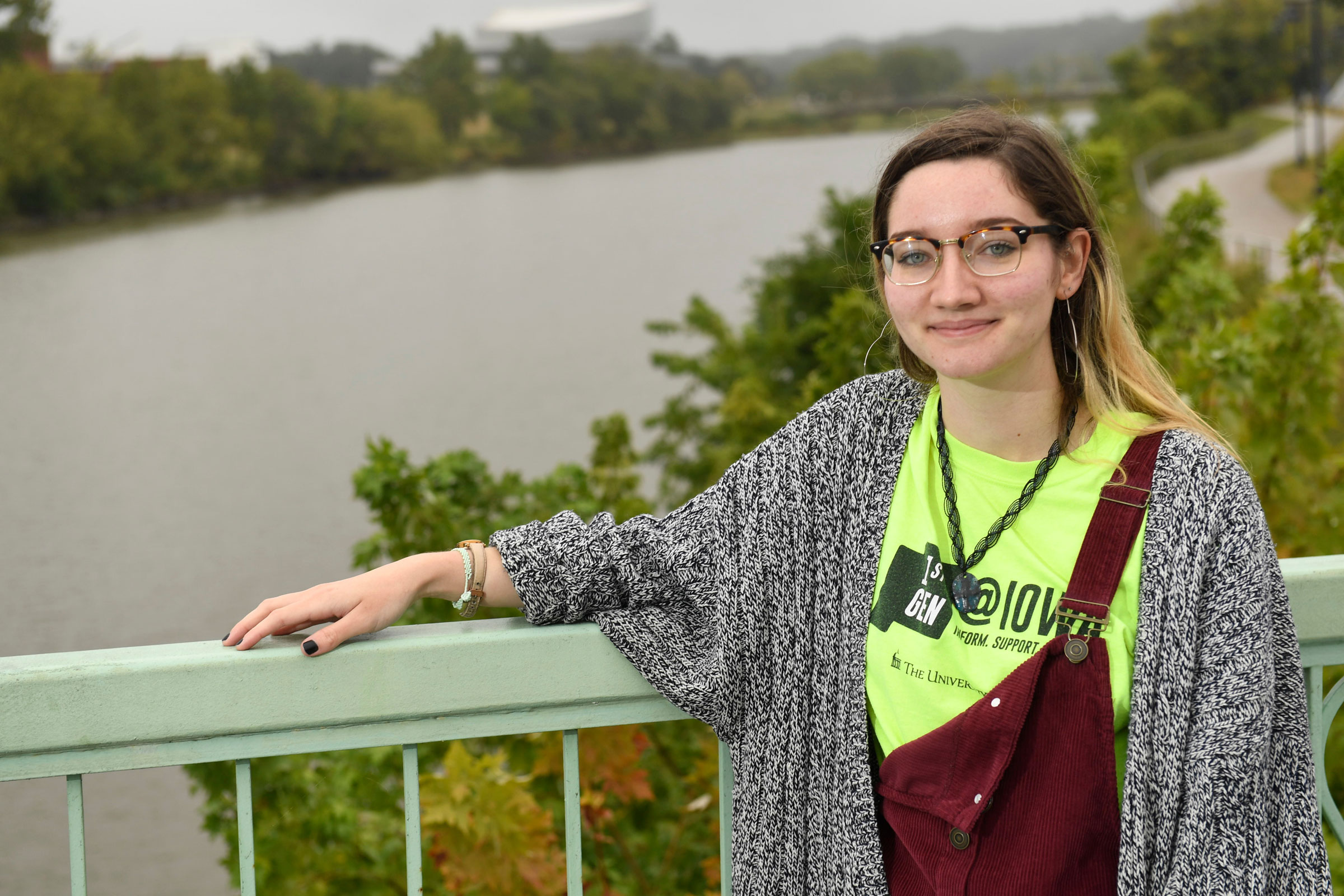
Elizabeth Folkers applied to the University of Iowa with the encouragement of her parents, high school teachers, and even a local lawyer. Still, she faced some significant barriers.
Folkers had always been a strong student, enjoying history, government, and politics classes, and was interested in attending the University of Iowa to pursue a major in one of those areas, especially after an internship with a local lawyer deepened her interest in becoming a lawyer.
“My parents always encouraged me. It was expected of me to go to college. But financially, we didn’t have the means,” she says. “And I would be the very first person in my family to go.”
One day, while perusing the UI’s Scholarship Opportunities page, she learned that as a first-generation student from the state of Iowa, she might be eligible for a Bright Scholars of Iowa Award, which would cover tuition and room and board for four years.
“It felt kind of like home to me more than the smaller schools I visited, since I’m from more of an urban metropolis. Even small things I noticed, like that there were compost bins everywhere and signs all over the Iowa Memorial Union saying that the LGBTQ+ community was supported, showed me that the University of Iowa had the environment I wanted.”
“I almost didn’t apply because it seemed like too much of an impossibility,” she says. “But I talked to one of my high school teachers about it, and she encouraged me. I ended up receiving some other small scholarships too, but if I hadn’t received the Bright, I don’t know what I’d be doing.”
Now a fourth-year pre-law student majoring in ethics and public policy and Spanish, Folkers is also conducting an honors thesis under the direction of a faculty member who has become a mentor. She credits the support from faculty, resources on campus—and that significant scholarship—with her success on campus and furthering her path toward law school.
But when she was admitted, she was a bit intimidated by the scale of the Iowa campus.
The ethics and public policy major emphasizes the study of reasoning and prepares students to bring a sophisticated, cross-disciplinary perspective to diverse fields such as business, government, urban and regional planning, social work, and law
“I wasn’t sure if I’d be able to make personal relationships with my professors as easily as I might be able to at a smaller school,” she says.
Folkers’ interest in the UI was solidified after she visited campus and liked the environment.
“It felt kind of like home to me more than the smaller schools I visited, since I’m from more of an urban metropolis,” she says. “Even small things I noticed, like that there were compost bins everywhere and signs all over the Iowa Memorial Union saying that the LGBTQ+ community was supported, showed me that the University of Iowa had the environment I wanted.”
The issue of social justice was on Folkers’ mind after some inspirational classes and a formative internship in high school.
“In some of my high school history classes, we learned about our country’s xenophobic history: first there was the Chinese Exclusion Act, then an anti-Irish movement. Also, this was around the time of the election in 2016, when immigration was becoming more of a national issue in general. It was like I saw history repeating itself in modern day.”
During her senior year, with the help of one of her advisers, Folkers secured an internship working for a lawyer.
In addition to getting to know faculty members, Folkers credits three significant sources for her success as a first-gen student:
- “I joined TRIO SSS my second semester, and it felt like the first time I was really getting to know people who were like me, people with similar backgrounds, in a college setting.”
- “The Center for Diversity and Enrichment, for the same reasons as above—and I just love going there and studying.”
- “My sorority, alpha Kappa Delta Phi, has a lot of first-gen students in it, and I love my sisters. They help me a lot with my experience.”
Her advice for prospective first-generation students?
“The hardest thing for me about being first-gen hasn’t been my experiences in college but more in looking for which college to attend. The hardest part was where to look, how to get scholarships, or which colleges had what programs. As a first-gen student, you might not really know the college-search timeline in the same way as those who have parents who’ve gone to college. So, I would advise getting an early start, in the beginning of junior year. Also, even though things like college tours are being impacted by COVID-19 right now, take advantage of that. Use this time to visit places virtually.”
“I was just helping with small tasks, but in the process, she taught me about how the legal world works, how law school works, and she even introduced me to a couple of her contacts who were immigration lawyers,” she says. “It was an amazing experience. I saw one of them give a presentation about immigration history and laws in the U.S., which opened my eyes to how immigration laws are traditionally racist and exclusionary, existing for very xenophobic reasons. I knew that that was an important world issue, especially in our country, and realized that was something I would want to go into.”
In addition to her double major, Folkers is pursuing a minor in Latina/o/x studies, as well as a self-designed specialization in sexuality and gender in social systems. She is also working on a senior honors thesis project in the sociology and criminology department under the direction of Jennifer Haylett.
Haylett says that as Folkers’ work on her thesis has progressed, she has gotten to know Folkers as a dedicated student who “actively makes connections between course material and the world around her, in addition to excelling when it comes to grades.”
“I find Elizabeth’s empathetic and inclusive demeanor inspiring,” says Haylett. “She has a clear, strong, intellectual curiosity and stands out because of her substantial level of engagement in and outside of class. She takes advantage of my office hours on a regular basis, which has allowed us to build a relationship and has allowed me to see her intellectual growth over the years.
“I’m a first-generation college student myself, and I find it impressive how Elizabeth has navigated university life, advocated for herself, and worked to build relationships with her professors. I am confident that Elizabeth has a bright future ahead of her.”
